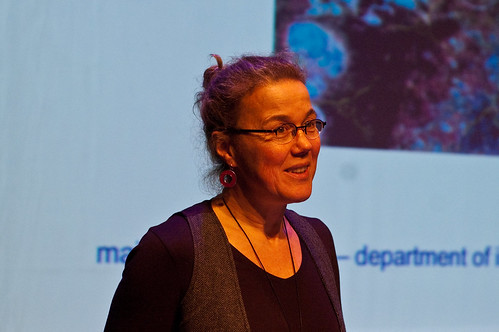
I would like to talk about my research which, I believe, could help us approach some of the questions related to Wikipedia. For this research, I was interested to know, how knowledge is translated/traveled; from people to things. I focused on community healers in rural India and observed the process by which their knowledge recorded, collected and disseminated through larger geographical areas. During its many transformations, the wisdom of the local healer goes through numerous phases and inevitably loses some of its essential characteristics. This observation has lead me to the question;
Can we define databases that makes these different ways of knowing things visible?
I believe this question relates to the equal treatment of different knowledges in technology design, ultimately aiming for a technology that contributes to knowledge diversity. So, with this talk, I am hoping to bring the issue of database design to the forefront concerning Wikipedia.
To illustrate her point on different database desing approaches to varying knowledges, Maja van der Velden then presents the following examples;
- Mukurtu archive (features collective tagging but also implementation of exclusionary login procedures)
- Tami (ontologically flat database – Minimizes Western assumptions on data collection by only categorizing by media type. No tagging, only a list of items listed by picture/sound/video etc. Each object can be connected to each other)
- Storyweaver (focus, again, is creating connectivities. Storytelling is a form of performative mapping. 3 protocols underlying; -Autonomous local knowledge mapping -Local ontology mapping -Merging mapping through making connections; Connections are made through context to context, not object to object in another context)
These databases have the underlying idea that Knowledge can be understood as performance. Implying that the design of a database is not preconfigured, but they emerge through usage over time.
Seen under this light of these examples, Jimmy Wales’s quote regarding the ultimate goal of Wikipedia (Imagine a world in which every single person on the planet is given free access to the sum of all human knowledge.) emerge as a warning. Given this understanding, Wikipedia’s understanding of knowledge becomes hegemonic. Such a definition of knowledge is very singular, other ‘knowledges’ are ignored. Aboriginal knowledge links back to traditional knowledge in English language Wikipedia, which is not recognized as proper knowledge. In this sense, Wikipedia becomes a master narrative about knowledge.
I would propose the creation of a third space, a contact zone where different knowledges not clash, but interact and co-exist. As Donna Haraway calls them; “world-making entanglements”, which is the meaning I want to carry over to Wikipedia. If Wikipedia aims to provide sum of all knowledge to everyone, how can it provide dissenting knowledge claims?
I argue that Wikipedia’s decentralized production system can be taken further as a model for its ontological stance as well, rendering a database that is more respectful to differing knowledge claims.
More information about her:


